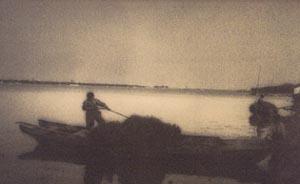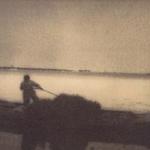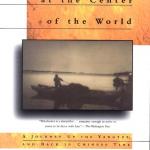The River
There is a saying that only mad dogs and Englishmen go out in the noonday sun, and perhaps one could also say that only an Englishman - author Simon Winchester, for example - would ply the entirety of China's Yangtze River (length 3964 miles) with such panache. Or an Englishwoman: in his account of his journey, The River at the Centre of the World, Winchester mentions "the redoubtable, imperturbable, amazing, thick-tweed-skirted and courageous matron adventurer" Isabella Bird, who in addition to voyaging around the Yangtze left a priceless record of colonial Malaysia, The Golden Chersonese. I have always suspected that the English addiction to travel is due to the unspeakable dreariness of their island in the North Atlantic, but perhaps there is some other "special singularity" (as Winchester puts it) in the British soul that makes their adventures so frequent, and frequently zany.
The inspiration for Winchester's book was an ancient Chinese handscroll showing the Yangtze before it became such a filthy, overdeveloped mess. According to Winchester almost 500 million people live in the Yangtze valley, and thus the river has taken on the unenviable task of discharging dead pigs, dead Chinese girls (murdered because of China's one-child policy and the overwhelming Chinese preference for sons), as well as the rather more prosaic waste produced by humans, including industrial chemicals and eroded soil. But the human creation most likely to threaten the Yangtze of yore is of course the Three Gorges Dam, which like the Great Wall of China is proving to be one of those monstrous constructions for which the Chinese have become famous, and which they seem to build for the sheer point of demonstrating Chinese willpower. But what needs to be demonstrated is that the Chinese can develop their country and feed their people in a sustainable way; and the Yangtze is so far only a testament to their failure.
The handscroll leads Winchester to propose that the Yangtze is a kind of time-line of Chinese history. At its mouth is Shanghai ("the most iniquitous town in the world, a cruel, mercenary city of white-hot passions and ice-cold hearts"), while the river's source is to be found in Tibet, considered by the Han Chinese to be one of China's most backward regions. "It was an imperfect argument, I could see," writes Winchester. "Other rivers shared something of the same kind: downstream means now, upstream means before on streams other than this....And yet - the Yangtze seemed, in this special context, more so." Fair enough, although like many contemporary authors Winchester spends too much time congratulating himself for arriving at this less than ingenious scheme. If the book has a main fault it is Winchester's garrulousness, a writing style as narcissistic as it seems humble, and which might best be summarized in the words, "Welcome to my brain." Maybe this is why the civilizations of China and Great Britain didn't hit it off too well (with the possible exception of Hong Kong, for reasons too obvious to relate): the Chinese are not known to talk overmuch.
Winchester's companion on the trip is a Chinese woman he calls Lily, who intercedes on his behalf whenever some humorless representative of official China suspects him of spying. Lily has no patience with officialdom; she says that the "fucking cadres" of the Communist Party are "idiots", while Winchester himself is content to call them "mulish". But Lily's nationalism can be ferocious, as when she scoffs at Winchester's attempts to unearth remnants of British colonialism in the Middle Kingdom. These include the anchor of a British ship that was almost destroyed by the Communists just before their seizure of power in 1949, as well as a memorial to a British shipmaster beloved by the locals for his devotion to "the River", the Yangtze. The anchor turns out to be a probable fake, while the memorial had been defaced by those irrepressible vandals, the Red Guards, during China's Cultural Revolution.
A former resident of Hong Kong, Winchester feels toward China a combination of admiration and incomprehension. Viewing the construction of the Three Gorges Dam first-hand, he admires the Chinese worker: "look away - and once he was, a bridge has risen! a trench has been dug! a building has advanced a floor!" Whatever one has to say about the Communists, they did restore Chinese pride, which had been all but vanquished by centuries of foreign humiliation (caused in part, of course, by the excessive pride of the Qing dynasty.) China, writes Winchester, "is complicated, ancient, infuriating and unashamedly powerful"; yet at times it also seems simple, meretriciously modern, and easily ignorable because the average Chinese remains unashamedly poor. Winchester offers a welcome qualification of Chinese industriousness: "the Chinese worker seemed always to work at half-speed, sleeping whenever he seemed not to be needed", while some Chinese sailors appear to be him to "mooching about idly". The Yangtze may be "the most important river in the world", as the author suggests, but he also believes that Shanghai's Oriental Pearl Television Tower, the East's tallest structure, is "unarguably the most vulgar". As it happens, many Chinese agree.
Like his book Krakatoa, The River at the Centre of the World is an engaging blend of travel writing, history and science. Winchester is awed by the sheer scale and power of the Yangtze, and his book is rich with impressive statistics regarding it, for example that the river's delta grows by 25 yards a year due to the "500 million tons of assorted alluvium" (plus the odd pig or girl) it expels. He suggests that China's geography may be one of the world's most hostile, as demonstrated in part by the recurrent flooding of its principal rivers, like the Yellow - known, says Winchester, as "China's Sorrow". But Winchester suspects that that the damage attributed to such flooding may be exaggerated by China's leaders in order to justify the Three Gorges project, one of whose stated goals is flood alleviation. Then again, should the dam be breached, the resulting destruction would be horrific. And if China keeps irritating its Muslim minorities in the province of Xinjiang, plans of the site may begin to appear in remote Afghani caves. 9/11 would be nothing next to that.
In many ways China provides a vision of what the planet would look like if our ingenious species prevails over all others, once and for all. To Lily's chagrin, Winchester grumbles about China's "utter and contemptuous disregard for her environment", but then he remembers that much of this may be explained by the country's overpopulation. It's a no-brainer, the choice between starving to death and eating an endangered species (like the decimated if not extinct Yangtze dolphin, once known as the "Goddess of the Yangtze") But Winchester's forgiving attitude doesn't last, and he deplores once again the "greed and carelessness" that has reduced the once "special" Gorges to a place marked by "pollution, squalor, filth, ugly architecture, wanton tree felling, factory building and artificially induced land erosion". The author comes close to suggesting that this delight in "ruination" is unique to the Chinese, but he might do well to recall that England during the Industrial Revolution was no bouquet of roses. Then again, some forecasts have China's population stabilizing at about 1.5 billion within the next few decades, which is to say that the country will add about the population of America to its already overstressed ecology. The Yangtze of Winchester's ancient handscroll will be ancient history indeed, as will what he calls China's "mute subservience to nature" - discernible, he argues, in the "gigantism of the world" to be found in Chinese classical art.
Winchester touches on a number of issues facing contemporary China. Like homosexuality, which many Chinese believe to be a disease (albeit treatable by such progressive methods as electroshock therapy), and moreover a disease seldom to be found within the country's borders. Another issue is Tibet, which also tends to get the under-the-carpet treatment, although Winchester does introduce one Chinese who rebuts the standard line that the Communist invasion was a liberation of a people oppressed by feudalism. The Chinese seem to be getting over its opposition to Western technology (like American Luddites from Thoreau to Melville, they felt that railroads were undesirable because they disturbed tranquility). But they have yet to prove, as the Japanese did, that they can produce Western technology better than Westerners can, until it is no longer Western, but the property of all mankind. After all, China is a country, Winchester reminds us, where gunpowder was invented for use in fireworks, not guns. So perhaps despite what they have done to the Yangtze, the Chinese know something that the Westerners - or "round-eyes", as the Chinese call them - do not.
- The End -
Review of Simon Winchester's The River at the Centre of the World: A Journey up the Yangtze, and Back in Chinese Time, Henry Holt & Company, Inc., 1996.
* * * * *
 ThingsAsian
ThingsAsian


















